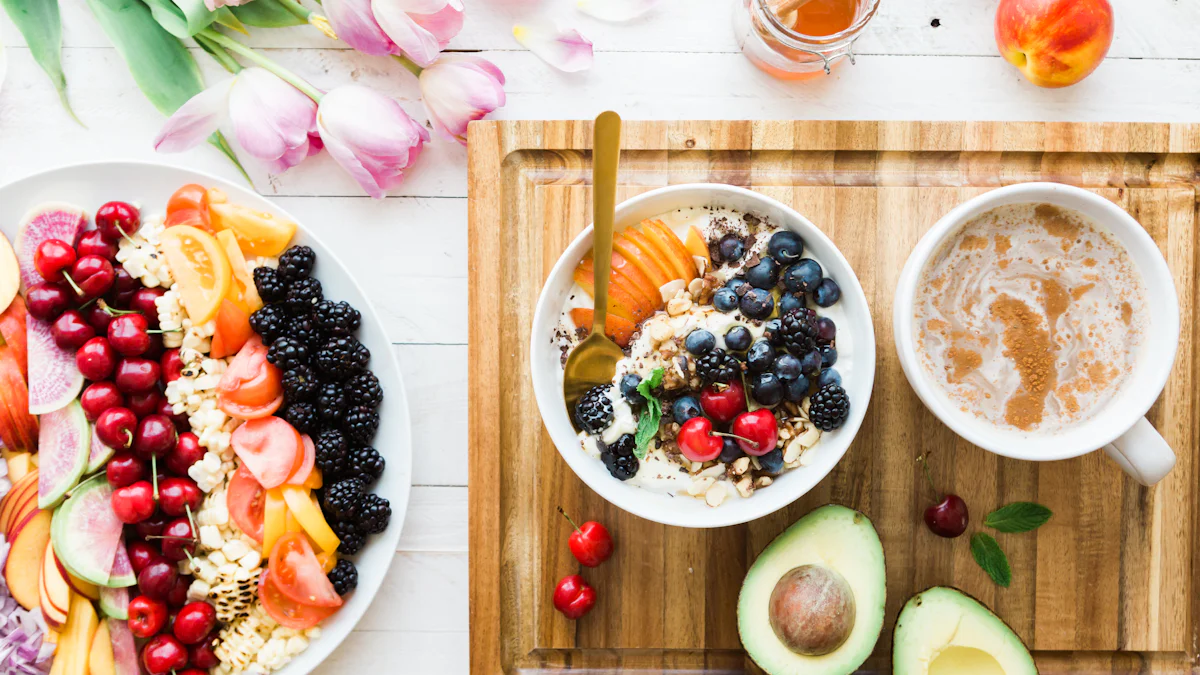Holistic Approaches to Healthy Skin: Discuss lifestyle factors beyond products that impact skin health

Beyond the Bottle: Understanding Skin Health
When it comes to healthy skin, it's essential to recognize that its significance goes beyond surface-level aesthetics. The skin plays a crucial role in maintaining overall health, serving as a protective barrier against environmental aggressors and regulating body temperature. However, relying solely on skincare products is not sufficient to ensure optimal skin health.
The Skin: More Than Just a Surface
The Role of the Skin in Overall Health
The architecture of the skin deserves special consideration in regard to nutrition. While dietary interventions can impact skin health, their effects may be limited and slow to occur. This highlights the need for a holistic approach that encompasses lifestyle factors beyond just topical treatments.
Why Skincare Products Aren't Enough
It's important to acknowledge that troubled skin requires more than just external support from skincare products. While these products play a role in nurturing the skin, they are not always capable of addressing underlying issues comprehensively. Expert opinions emphasize that managing skin health is more about long-term care and maintenance rather than seeking quick remedies through products alone.
The Holistic Perspective on Healthy Skin
Integrating Lifestyle Choices for Skin Health
A holistic approach recognizes that factors such as diet, stress levels, and emotional well-being significantly impact skin health. By integrating healthy lifestyle choices, individuals can provide comprehensive support for their skin, promoting its resilience and vitality from within.
The Limitations of Skincare Products Alone
Skin can visibly respond to stress, indicating that its well-being is influenced by various lifestyle factors. This underscores the limitations of relying solely on skincare products to address all aspects of skin health. Therefore, embracing a holistic perspective is crucial for nurturing healthy and radiant skin.
The Impact of Diet on Your Skin
When it comes to achieving healthy skin, the impact of diet cannot be overstated. The nutrients you consume play a vital role in nourishing your skin from within, influencing its resilience and overall appearance.
Nutrients That Nourish Skin from Within
Vitamins and Minerals Essential for Skin Health
A well-rounded intake of essential vitamins and minerals is crucial for maintaining healthy skin. Vitamins A, C, E, and D are particularly renowned for their skin-nourishing properties. Vitamin A supports skin cell production and repair, while vitamin C aids in collagen synthesis, promoting elasticity and firmness. Additionally, vitamin E acts as a potent antioxidant, safeguarding the skin against free radical damage. Vitamin D contributes to skin cell growth, repair, and metabolism.
In addition to vitamins, minerals such as zinc and selenium play pivotal roles in supporting skin health. Zinc aids in regulating inflammation and sebum production, contributing to acne prevention. Selenium acts as an antioxidant that helps protect the skin from UV-induced damage.
Foods to Favor for a Glowing Complexion
Incorporating nutrient-rich foods into your diet can significantly contribute to a radiant complexion. Fruits like berries, which are rich in antioxidants, aid in combating oxidative stress that can lead to premature aging. Vegetables such as spinach and kale provide ample amounts of vitamins A and C essential for skin health. Including sources of healthy fats like avocado and nuts can help maintain the skin's moisture barrier.
Foods to Avoid for Healthy Skin
The Effects of Sugar and Processed Foods on Your Skin
Consuming excessive amounts of sugar can lead to a process called glycation, where sugar molecules attach themselves to proteins like collagen, resulting in advanced aging signs such as wrinkles and sagging skin. Processed foods high in refined carbohydrates can also trigger inflammation linked to various skin conditions including acne.
Hydration: The Foundation of Healthy Skin
Proper hydration is fundamental for maintaining supple and radiant skin. Dehydration can compromise the skin's barrier function, leading to dryness and dullness. Consuming an adequate amount of water throughout the day supports optimal cellular function within the skin layers.
By prioritizing a diet rich in essential nutrients while minimizing consumption of detrimental foods, you can significantly influence your overall skin health from within.
Stress and Sleep: The Invisible Aggressors
Stress and sleep play pivotal roles in skin health, influencing its overall condition and appearance. Understanding the link between these lifestyle factors and skin health is essential for adopting a holistic approach to skincare.
The Link Between Stress and Skin Health
Chronic stress can have profound effects on your skin, contributing to various issues such as acne, eczema, psoriasis, and premature aging. When you experience stress, your body releases cortisol, a hormone that can lead to increased oil production in the skin, potentially resulting in breakouts. Moreover, prolonged stress can impair the skin's barrier function, making it more susceptible to environmental damage and moisture loss.
Mindfulness Practices to Reduce Stress
Incorporating mindfulness practices into your daily routine can help mitigate the impact of stress on your skin. Activities such as meditation, deep breathing exercises, and yoga have been shown to reduce cortisol levels in the body, promoting a sense of calmness and relaxation. By managing stress effectively through these practices, you can support your skin health from within.
The Importance of Quality Sleep for Skin Regeneration
Quality sleep is crucial for facilitating skin repair and regeneration. During sleep, the body undergoes processes that are essential for maintaining healthy skin. One of these processes involves the production of collagen, a protein responsible for maintaining the skin's elasticity and youthful appearance. Collagen production helps repair damaged skin cells, promote a healthy skin barrier, and minimize the appearance of fine lines and wrinkles.
Tips for a Better Night's Sleep
Establish a consistent sleep schedule by going to bed and waking up at the same time every day.
Create a relaxing bedtime routine that signals to your body that it's time to wind down.
Ensure your sleep environment is conducive to quality rest by keeping it dark, quiet, and at a comfortable temperature.
Limit screen time before bed as exposure to blue light from electronic devices can disrupt your sleep-wake cycle.
Avoid consuming caffeine or heavy meals close to bedtime as they can interfere with falling asleep.
By prioritizing quality sleep and implementing strategies to reduce stress levels, you can significantly contribute to the overall well-being of your skin.
Navigating Environmental Factors
When it comes to healthy skin, understanding the impact of environmental factors is crucial for maintaining its vitality and resilience. Both the sun's rays and air pollution can significantly influence skin health, necessitating protective measures and strategies to mitigate their adverse effects.
The Sun: Skin's Friend and Foe
The sun, while a source of warmth and light, also poses potential harm to the skin due to its ultraviolet (UV) radiation. Prolonged exposure to UV rays can lead to various skin issues, including premature aging, sunburn, and an increased risk of skin cancer.
Protecting Your Skin from Harmful UV Rays
Shielding your skin from harmful UV rays is essential for preserving its health and youthful appearance. This involves adopting protective measures such as wearing broad-spectrum sunscreen with a high SPF, seeking shade during peak sunlight hours, and donning protective clothing like wide-brimmed hats and sunglasses. Additionally, being mindful of reflective surfaces such as water, sand, or snow is important as they can intensify UV ray exposure.
The Benefits of Moderate Sun Exposure
While excessive sun exposure can be detrimental to skin health, moderate amounts of sunlight offer benefits such as vitamin D synthesis. Adequate levels of vitamin D are essential for overall well-being and may contribute to healthy skin by supporting immune function and reducing inflammation.
Pollution and Your Skin
Environmental air pollutants can have detrimental effects on the skin, leading to oxidative stress, inflammation, premature aging, and other dermatological concerns.
How Environmental Pollutants Affect Skin Health
Exposure to air pollutants induces oxidative stress in the skin by increasing reactive oxygen species. This oxidative stress contributes to extrinsic skin aging, allergic conditions, inflammatory responses during wound healing, and an increased risk of developing certain types of skin cancers.
Strategies to Shield Your Skin from Pollution
Implementing protective measures against environmental pollutants is vital for safeguarding skin health. These measures include cleansing the skin thoroughly at the end of each day to remove accumulated pollutants. Additionally, using antioxidant-rich skincare products containing vitamins C and E can help combat oxidative stress induced by air pollutants. Creating a barrier between the skin and environmental aggressors through moisturizers or serums with protective properties can further minimize their impact on the skin.
By understanding how environmental factors affect skin health and implementing protective strategies accordingly, individuals can navigate these influences effectively while promoting overall skin wellness.
Crafting Your Holistic Skincare Routine
As you embark on the journey towards healthy skin, it's essential to craft a holistic skincare routine that harmonizes with your lifestyle choices and complements your skin's natural vitality.
Balancing Skincare Products with Lifestyle Choices
Selecting Products That Complement Your Lifestyle
When curating your skincare regimen, consider incorporating plant-based formulas and essential oils, as advocated by holistic skincare practitioners like Magdalena Tomczak. These natural ingredients can provide nourishment and support for healthy skin while aligning with a holistic approach to skincare. Additionally, prioritize products that resonate with your values and preferences, ensuring that they contribute to both your skin's well-being and your overall sense of wellness.
The Role of Routine in Skin Health
A consistent skincare routine is fundamental for nurturing healthy skin. Embracing a regular practice of cleansing, moisturizing, and protecting the skin from environmental stressors can promote its resilience and radiance. This routine should be adaptable to accommodate changes in your lifestyle or seasonal variations, allowing for continuous care tailored to the evolving needs of your skin.
Putting It All Together: A Plan for Healthy Skin
Crafting a comprehensive plan for healthy skin involves integrating daily, weekly, and monthly skincare practices that synergize with lifestyle factors such as nutrition, rest, movement, and social connections.
Daily, Weekly, and Monthly Skincare and Lifestyle Tips
Daily: Begin each day with a gentle cleanse followed by hydrating toners or serums to replenish the skin's moisture. Apply broad-spectrum sunscreen before stepping outdoors to shield your skin from UV rays. In the evening, engage in a calming nighttime ritual involving gentle cleansing and nourishing treatments to support overnight rejuvenation.
Weekly: Dedicate time for exfoliation to remove dead skin cells and enhance product absorption. Consider incorporating face massage techniques into your weekly routine as suggested by holistic skincare advocate Magdalena Tomczak, promoting circulation and lymphatic drainage for improved skin health.
Monthly: Treat yourself to indulgent self-care sessions such as facial masks or at-home spa experiences. These moments of pampering not only benefit the skin but also contribute to overall well-being by fostering relaxation and rejuvenation.
Adjusting Your Plan as Your Skin and Lifestyle Change
As you progress on your holistic skincare journey, remain attentive to signals from your skin indicating its evolving needs. Be open to adjusting your skincare routine in response to changes in climate, stress levels, or other lifestyle factors. Just as our bodies adapt over time, so too should our approach to nurturing healthy skin through mindful adjustments aligned with our ever-changing lives.
See Also
How Your Diet Impacts Your Skin: The Influence of Nutrition
Daytime vs. Nighttime Skincare: Understanding the Contrast
Harnessing Retinol's Potential: Boosting Skin Vitality with Vitamin A
Hydrate Your Skin: The Benefits of Hyaluronic Acid Serum
Revolutionary Anti-Aging: The Science behind K-Miracle Callus Extracts Cream
